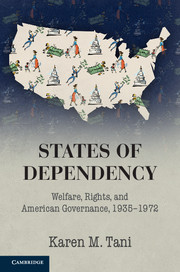PART II - 1950 TO 1972
Published online by Cambridge University Press: 05 April 2016
Summary
By 1950, federal administrators and their allies had achieved remarkable successes in their battle to make poor relief part of a more modern (as they understood it) pattern of governance. But changes in the political climate now made their previous tactics less effective. Those changes emboldened political enemies, new and old, and ultimately encouraged a different set of liberal reformers – outside of the administrative state – to pick up where New Deal administrators had left off.
Chapter 5 follows the federal-state public assistance program into the early 1950s, when restive state politicians, not recalcitrant local officials, were federal assistance administrators’ biggest problem. With federal encouragement, most states had developed the administrative machinery and supervisory capabilities that they lacked in the 1930s. In the meantime, statutory reforms, administrative practices, and socioeconomic changes had caused the number of public assistance recipients to grow and their perceived deservingness to wane. But federal administrators, many of whom had been in place since the mid-1930s, continued to push their New Deal vision. With the Depression over and more conservative leadership in Congress, some state officials pushed back: throughout the early Cold War period, they questioned federal policies, disobeyed federal agency mandates, and, with increasing confidence, advanced their own interpretations of federal law, sometimes even attempting to drag the federal agency into court. I document these trends by examining several of the states that, for varying reasons, posed the most serious challenges to federal administrators between 1950 and 1954. They are not the states that scholars might expect. To date, studies of postwar welfare “backlash” have tended to focus on the Deep South and have invoked race as the key explanation for that backlash. The episodes detailed – involving Arizona, Indiana, and New York – invite a more nuanced interpretation in which race figures importantly, but so, too, do concerns about federal overreaching, suspicions of bureaucratic governance, long-simmering resentments of the New Deal, and Americans’ growing sense of themselves as “taxpayers.”
By the mid-1950s, public assistance had become entangled in the postwar politics of racial equality, female sexuality, and urban change. Many states proposed restrictive amendments to their welfare laws, hoping to prune unwed, nonwhite mothers from their welfare rolls and to monitor tightly those who remained.
- Type
- Chapter
- Information
- States of DependencyWelfare, Rights, and American Governance, 1935–1972, pp. 151 - 154Publisher: Cambridge University PressPrint publication year: 2016



